Wanago
I started my entrepreneurial journey in 2016. I was finishing my Bachelor in Economics at the University of Lausanne at the time. I’ve always wanted to create something from scratch. I decided to apply to the entrepreneurial contest Start Lausanne with a friend, and present the following idea:
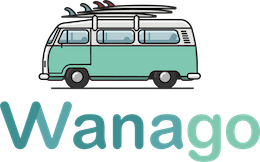
A specialized kickstarter to fund vans and motorhomes.
Wanago is the first van acquisition crowdfunding platform. Should someone wish to buy a van, but does not have enough money to acquire his dream model, he can simply create a project on www.wanago.fr.
He indicates the desired model, the amount he lacks to buy it and the dates at which he won’t be using it the first year after his potential purchase. On the other side of the platform, many different contributors select this project. They get to choose one of the available dates and commit to paying the corresponding amount.
Thanks to the money pledged by all contributors, the project holder can acquire his vehicle. On the other hand, the contributor gets to enjoy low tariffs and a vehicle in good condition. We offer an insurance contract for every reservation made. If the target amount is not reached, no contributor will be debited.
The origin
The idea came from a discussion with a friend. He needed to change his car. At that point, I was very fond of crowdfunding, and humourously suggested that he would launch a project on Kickstarter and wait for people to pledge money.
Thinking about it for a few days I figured what lacked was simply a right counterpart for the money pledged. How about letting the contributors try the car?
Then, after diverse discussions and meetings, Kyle, my co-founder I’ll introduce right after, and I, realised the van and motorhome market, which I did not know anything about, was best suited for this idea. Indeed, van owners spend huge amount of money on those vehicles (60K ++), but can only enjoy it few weeks a year. Helping them finance it through 1 to 2 months rental following the purchase seemed like a good deal! We also felt it was best to launch the project in France, since Switzerland is too small and motorhome is not very popular there.
The first mockups of the platform also included financing boats on the same concept:

Building a team
At first, I was alone. The friend who joined me for the contest did not want to work on the project. Therefore, I started to look for a co-founder with a complementary profile.
I was going to the gym of few times a week and always had great pleasure to talk to Kyle, a communication science student and friend of mine.
While discussing the project with him (between two biceps sets), I could feel that he was very interested and had an unexpected entrepreneurial mindset.
A few discussions later, Kyle joined me!

We were both students, meaning that it was hard to spare some working time on the project. Still, we managed to work remotely, he was in Geneva and Neuchatel, I was in Lausanne. We met in my house in the weekends and had a room dedicated to the project, full of stickers…
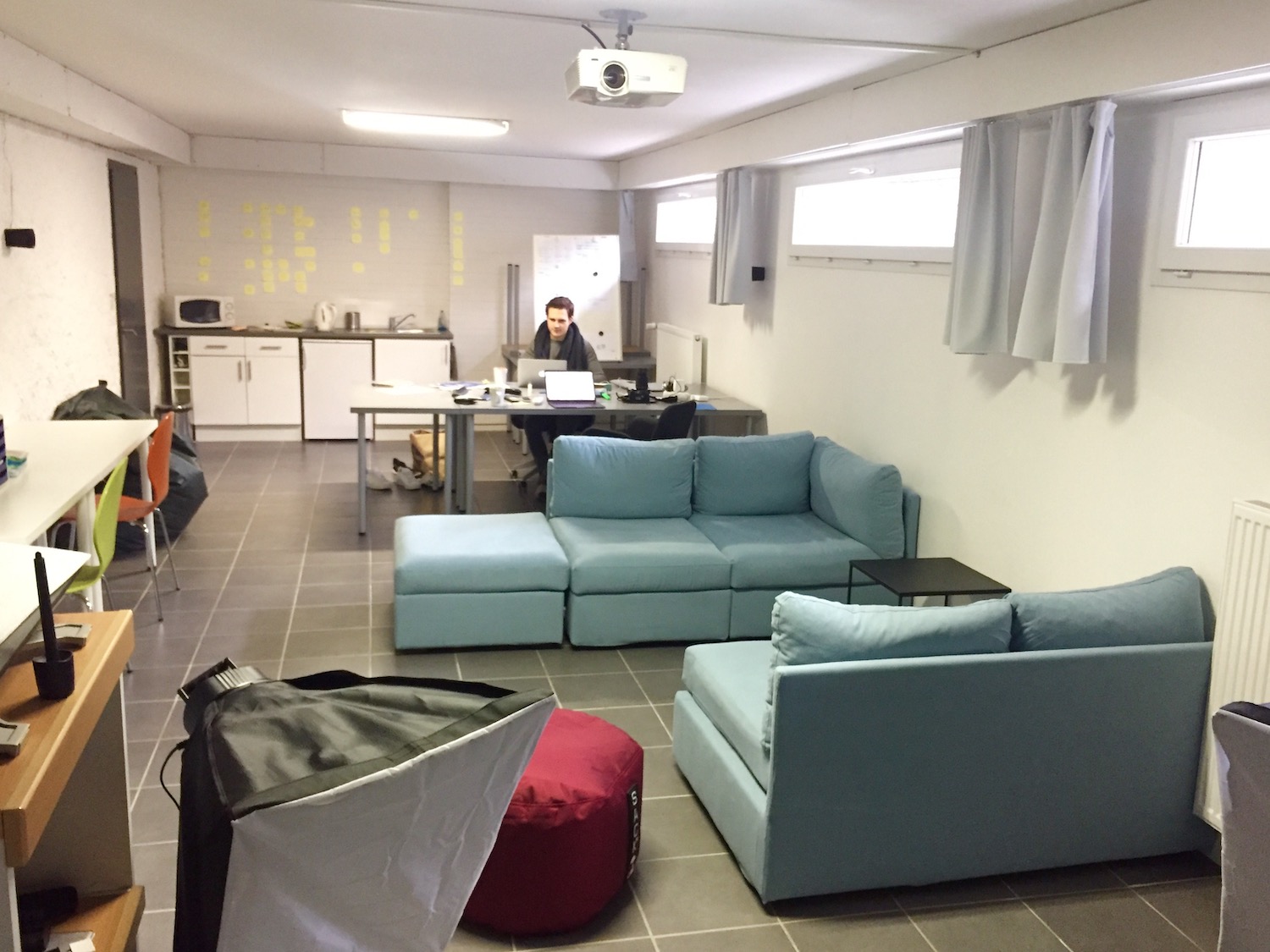
A few months in, Natascha joined us, and had a profile much similar to Kyle’s. Therefore, it was rather delicate to distinguish each one’s task in this situation, but all the help was much appreciated.
The contest
Start Lausanne is an entrepreneurial contest in Switzerland, on the campus of Lausanne. Students can apply with a simple idea, and must pass several steps in order to earn up to 30’000 Swiss Francs prizes.
The steps are classic I guess:
- Elevator Pitch, a 2mn pitch in front of 8 jury members
- Business Model, a document to fill in and present describing your proposition and how you intend to make money
- Business Plan, a full document describing your company, the team, the customers, partners, channels…
- A final public presentation in front of 400 people
The whole process takes 5 months, and some lectures on entrepreneurship are given to participants. At the beggining, there are over 65 projects. At the end, 3 startups will win something:
- the first prize, 20’000 €
- the second prize, 5’000 €
- the jury prize, 5’000 €
The outcome of the contest was rather positive. We earned the Jury Prize as well as 5’000 € to start our business. If you’d like to download our old brochure, just click here.
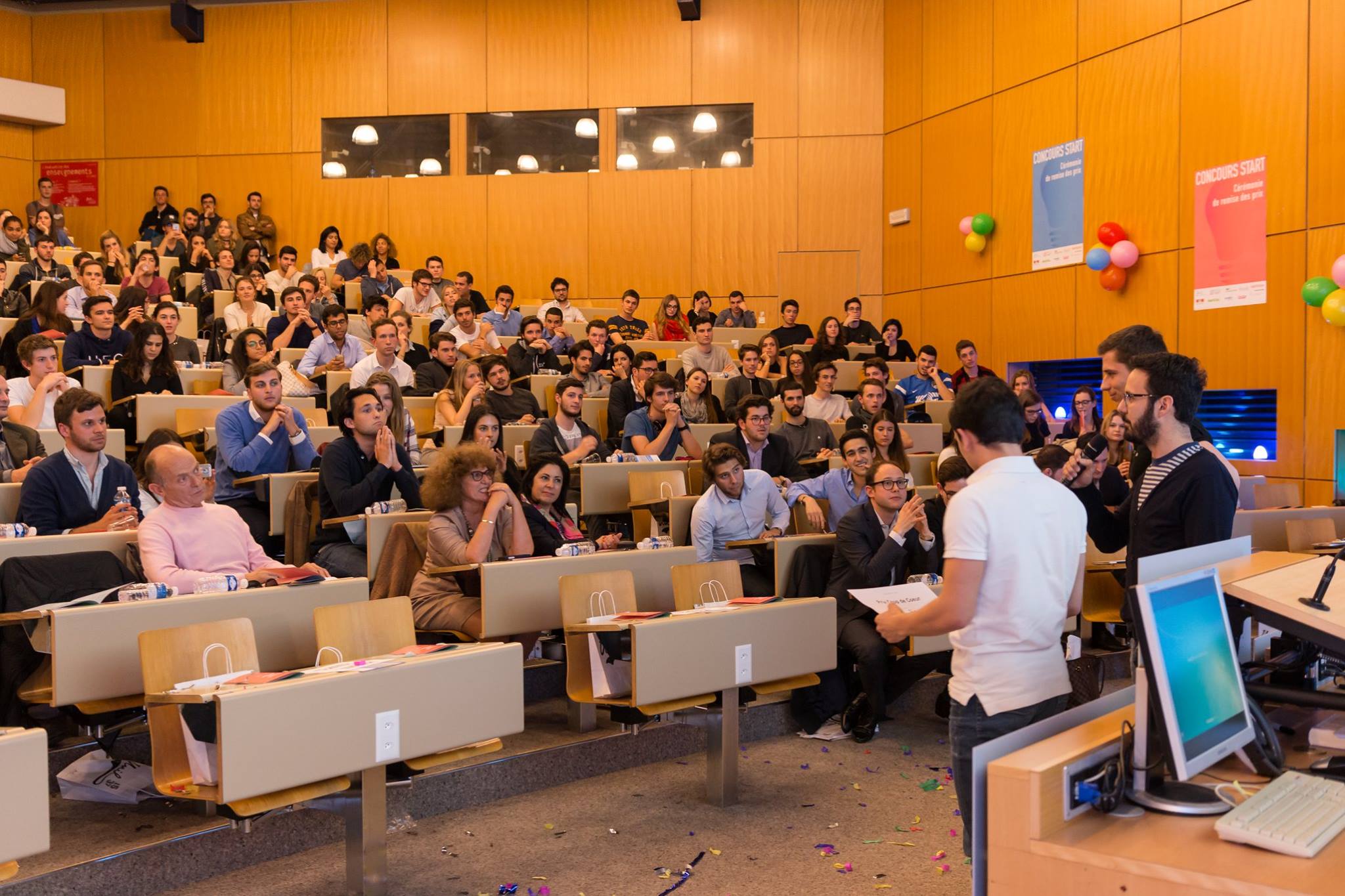
After the contest, first mistakes
Time to make the project come to life had come. Once you receive the money, you start thinking about how to spend it wisely.
Our biggest need was a website. We then started to reflect upon what was needed to deliver the Minimum Viable Product ASAP, since we had some press coverage and surfing on that wave was easy.
This is where we made our biggest mistake. We identified what we thought was our MVP. A platform on which customers could pre-book a vehicle, which would automatically update the amount pledged on the project, send emails, and if the target amount had been reached, it would lock all the pledges, debit them and wait for approval of the project owner to transfer the funds. We also offered dashboards on both sides for the users.
We loved this idea so much that we did not realize how easy it would have been to build a simple static WordPress where we would manually update the amount pledged. It would have taken us 1 week at most.
Instead, we focused on identifying the best web development company to work with, since both Kyle and I were not web developers. Partnering with a web developer would have also been a great choice, but none seemed interested in joining the founding team. Indeed, we were not offering enough capital I guess, and under-valued the importance of the website which was a mistake too.
We started working with a Junior Entreprise (JE) who hired students with web development skills to work on this project during their free time. The website, consisting of a C2C marketplace with a lot of security layers and payment solutions was an important task to accomplish.
The first student was late for the design delivery, but the platform looked quite good:

3 months had already passed, and the latter decided to quit the project. We only had a design at that point.
The JE was unable to find other students, and the director of the JE himself started to code on the project on his free time. Needless to say, all delivery dates were obsolete by then, and this situation lasted for 6 more months.
On the side of that, Kyle and I were preparing all the communication of the company, the contracts, with a law firm, the partner dealerships or getting press coverage. I learned how to use Adobe Illustrator, make logos, work with social medias, build a blog, contact influencers…
Here’s the kind of posts we did on the different social medias:
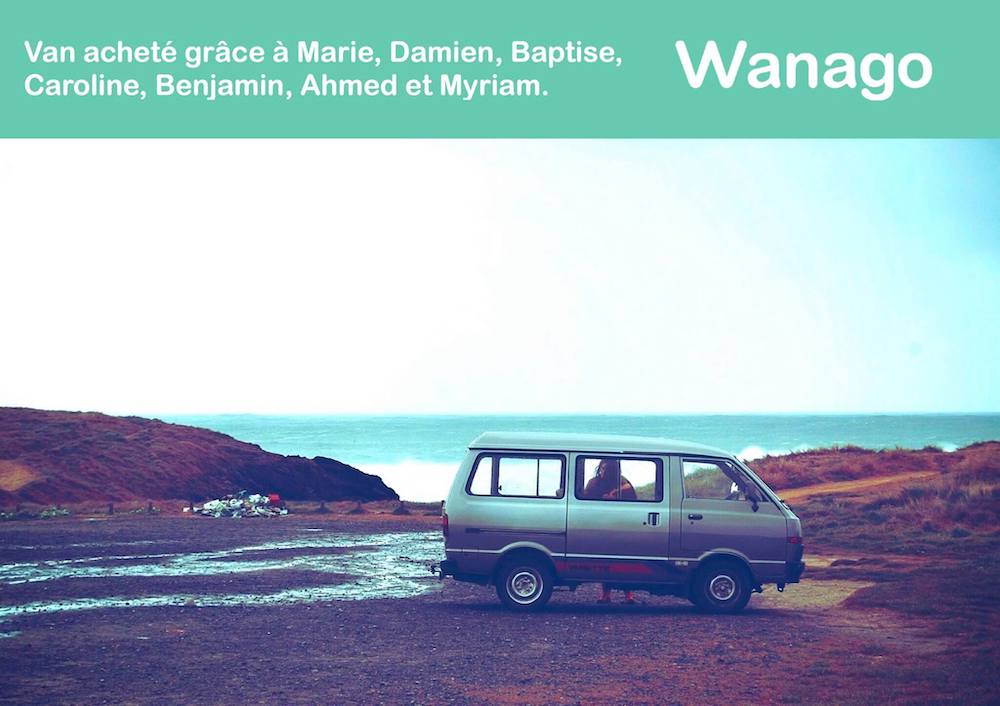
9 months in, we finally had to hire 2 more developers to finish the website who turned out to be great and made it in 2 months.
It might seem crazy, but we lost a whole year on that. As described above, many mistakes were made, on the definition of the MVP and the partners we hired. We spent a little more than 8’000 € on the website.
In order to make things move faster, I was obliged to get interested in web development. It was my first introduction to version control, HTML, CSS, JavaScript… I was in charge of the layouts and the blog we created.
Another mistake we made (yes, let’s talk about all of them in this article), was to get proper contracts and conditions written by a law firm. Although they agreed on a large discount out of interest and their will to help a startup, we still spent more than 3’000 € in the process. Adding to the 500 or 600 € required to start a limited company in France, we ended up spending more than 11’000 € before launch.
One critical element which was essential to launch was a partner insurance. We needed to offer proper rental insurance to guarantee the vehicle owners that whatever happened, the vehicle was insured.
It took us three months to acheive this. Eventually, MAIF Insurance agreed to cover us and offered a daily contract to our customers. The price was high (15€ per day), but that was the best we managed to obtain.
Part of the value proposition for us was to be cheaper than classical rental, and if we wanted to take a 10% commission on the amount pledged, and give money to the insurance company, the future owners needed to agree to cheap rental prices.
The launch process
1 year after the contest, we were ready to launch, finally. We set up a good communication on Facebook (which was still more or less used in 2017) and Instagram, gathering a little more than 1’000 persons on each.
I also created a mailing list with over 5’000 van and motorhomes fans, for free. This was a funny trick. I created a fake Facebook profile named “Camping-car Liberté”, which means Motorhome Freedom. I started creating some content (pictures taken on roadtrips…) and added as many people as I could. Our target focused on 50-65 y.o. early retired or close to be. Most of them did not really spot the difference between a facebook page or an account. The key difference being that you can export the email addresses of your Facebook friends! With 5’000 friends, the official limit, I took all the emails to Mailchimp, and our launch database was ready.
We also shot a video, realized by a friend of mine and a stuntman (also a friend). All the people involved in the video came on their free-time, and it was exceptionnal to witness how good friends are willing to help you succeed on your project. We even met, while shooting the video, a retired couple traveling in a motorhome, who participated in it !
The launch day, we needed a project online. We uploaded a fake project, as an example, and waited for the first real project to come.
Within the first few hours, we had 5 or 6 projects that were started, but none of them were submitted to us. People were stuck on the page where they had to describe the vehicle they wanted to buy and why people should help them. Anyways, these were real leads that we could eventually convert at some point.
First event, first customer
Right after the launch, we attended the biggest event in France for Volkswagen Combi fans, near the Chateaux de la Loire. It’s an institution for van lovers, and definitely a great customer basis.
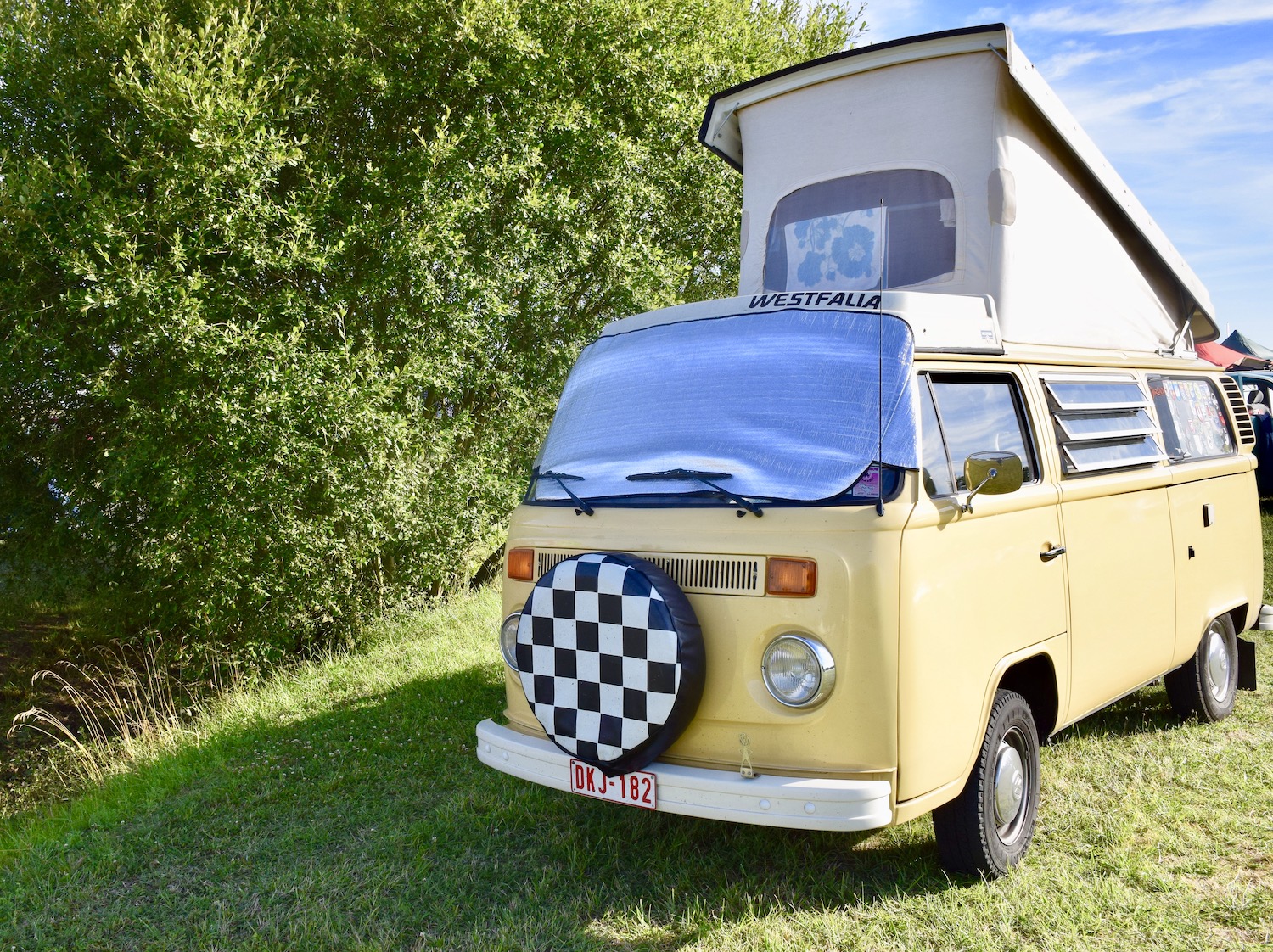
More than 1’000 people camped there at night, attend demos, shows and talk to each other about their vehicle. We went there with my mother’s car, a large 7 seats car that we pretended was a van, and put Wanago stickers all over it.
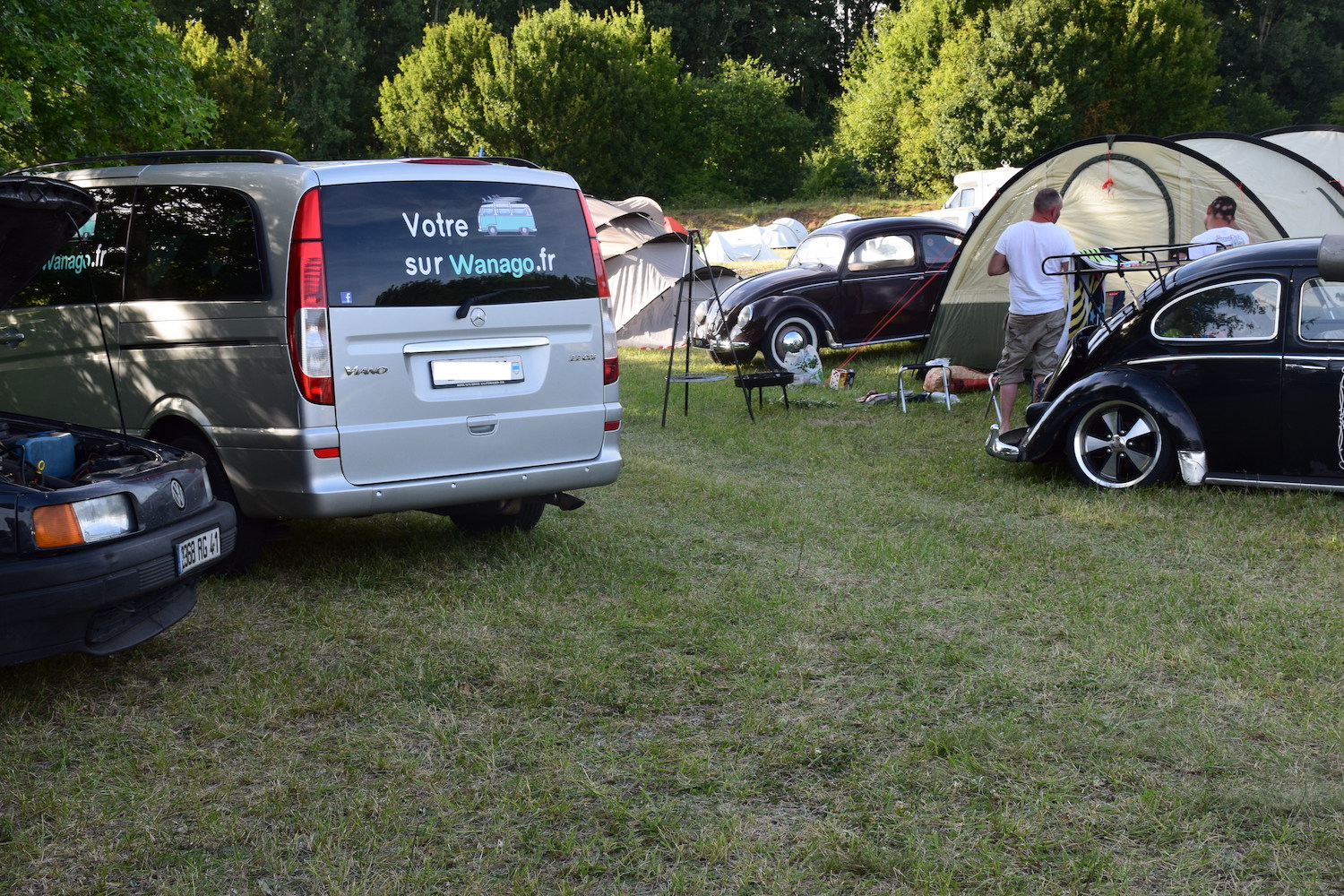
We printed hundreds of flyers, talked to every single individual we met, organized a volley-ball tournament…

And eventually made one great move. At the end of the weekend, we stood by the exit, parked our car, put our Wanago t-shirts and distributed flyers to everyone, thanking them for their visit at the event. Everyone thought we were officials, hundreds of flyers were gone, and the visits on our website just peaked afterwards.
And there we had it, our first customer. A couple we met during the event, who already owned a van and wanted to buy a second one. We then started to get in contact with them, did our best to get visits on the website and then get some press coverage in french magazines and newspaper :
- Ouest France
- Campingcar Le Site
- Esprit Campingcar
- Quimper Ma Ville
- Camp US
- HEConomist
- Innovation Time
- Planet Ride
- Interview
Kyle speaks really well and is at ease when it comes to cameras.
The idea was to finance 3’000€ for a VW Combi Van, in exchange of rentals starting at 65€ per day. That was a really good deal for VW vans.
However, we were late September, and these vehicles cannot really be used in Winter. Few people were interested in booking a rental for next spring. We did not anticipate such seasonality in this business, and probably should have launched later in the year (or earlier…).
The project remained online for 1 month, and we did not manage to raise more than 1’600€. It was a first failure, but we still managed to confirm that some people are interested in renting such vehicles in advance.
Let the press do the work
We acquired our second customer through one of the articles that we had in the press. They completed the project perfectly, and had a great story to share since they wanted to buy a van and travel around Europe with Iris, their 9 months baby.
They even made a video to present the project and their family. All we could dream of. It’s the perfect kind of early adopter you’re looking for at this step of a project. They even made a background sound playing yukulele in their living room.
We could not fail it, not a second time. They wanted 2’000 €, which was easier to finance. The van they wanted could be used in winter, it was bigger, more comfortable and customers could rent it only 2 months from now.
We put in a lot of efforts to get the previous customers back in the game and get them to pledge money on this new project. We also made our families contribute and buy weekends. We were really close to the target, at 1’700 € instead of 2’000 €. With only a few days left, and since the birthday of a friend of mine was approaching, I asked my university class whether they wanted to all contribute to a 4 days roadtrip on the van, as a birthday present. And it was a yes. We raised an additional 400 € and reached the target.
The family was then able to buy the van 10 days later.
First rentals
What came next was really exciting. The whole process we built for a year now was coming to life. The money was debited, we sent emails to each contributor, we signed insurance contracts, sent the brochure and the detailed explanations to everyone.
The feedbacks we had from rentals were amazing. It had a good chat with the friend whom we offered the rental to. He went to Normandie with some friends, slept in incredible places and was really happy of the experience.
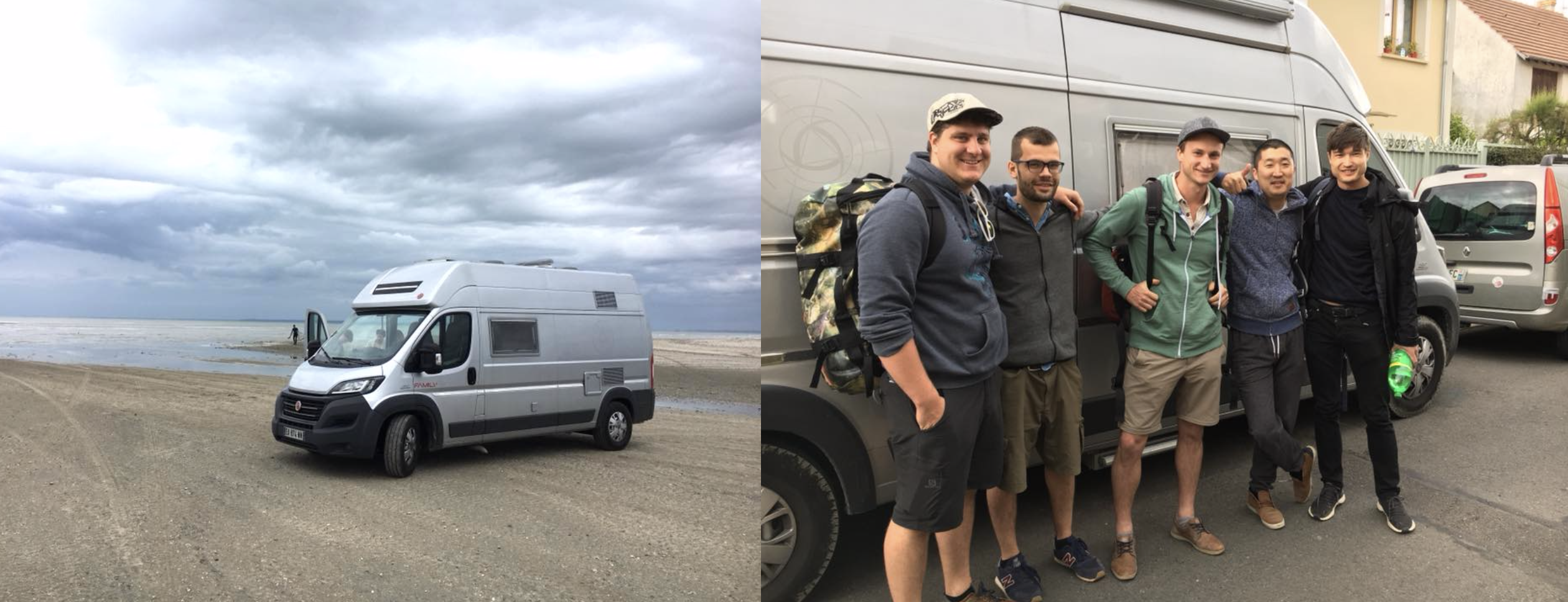
The owners were also really happy. The amount they collected was small, and did not represent more than 5% of the vehicle’s value, but it was still a win. This system could work.
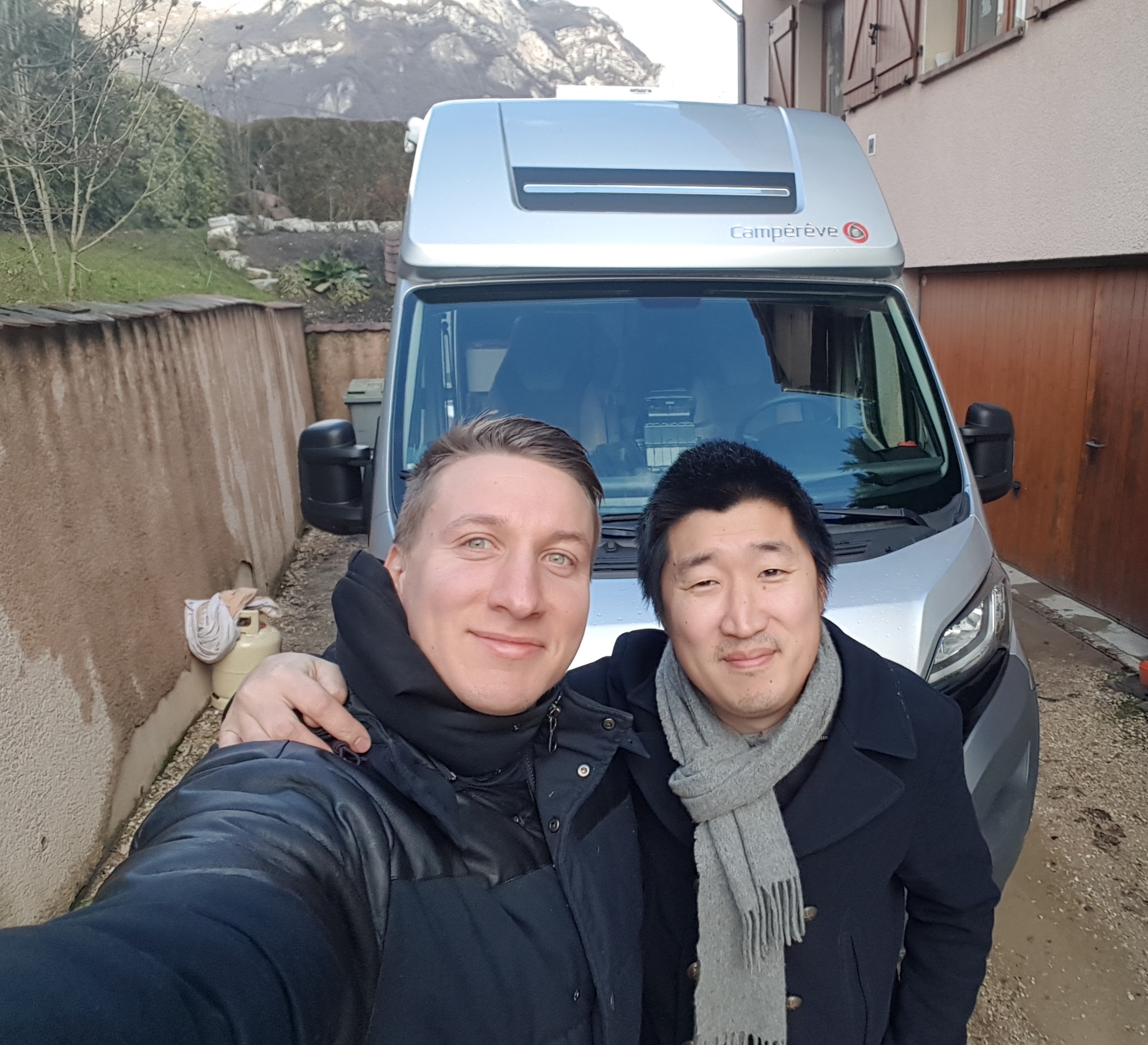
We made our first 250€ from our business. Definitely not easy to make, one month of work just on this project and 1 year prior, but we were happy.
Big events, big partners
An unexpected big partnership with Peugeot Citroen (PSA) got us some attention. We met with the directors of the van department, they liked the project and invited us to events. That partner being in, other joined us, van dealerships essentially. We sent them some flyers to give to their customers, and displayed our logos mutually on our websites.

PSA invited us to the largest motorhome event in France, called the VDL Show. We had our own booth inside their’s.
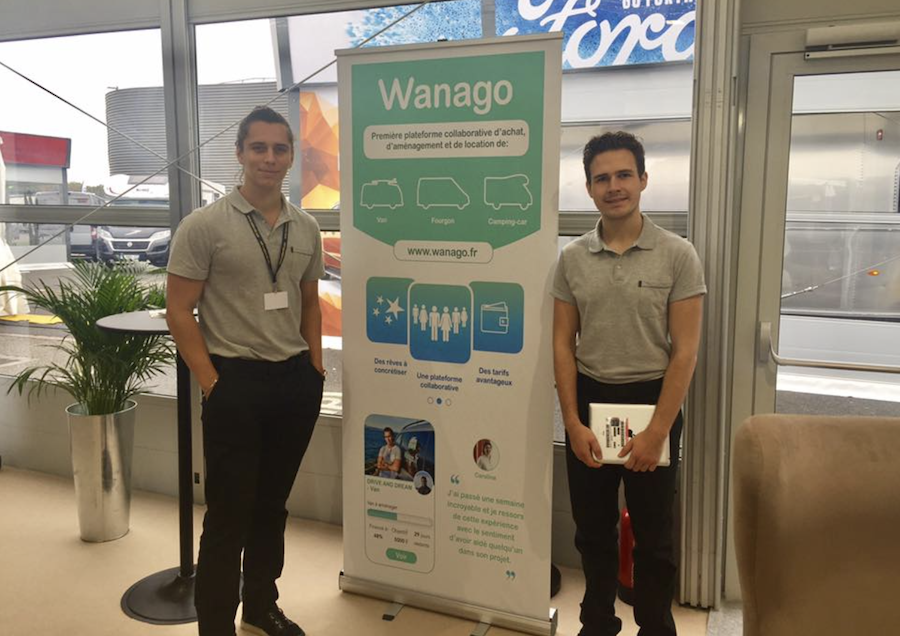
We could introduce our solution to customers wanting to purchase a PSA van, and in exchange, we became “Product Genius” and were answering questions of the customers.
Kyle and I were still studying at that time. I had to go back to class between Tuesday and Friday, and Kyle’s mother did a great job by helping us. It’s also in those cases that you realize how much a co-founder’s choice matters.
A few weeks later, we also attended in Düsseldorf the largest european event and met partners there.
These events are good for the image and to understand the industry, but when it comes to actually getting leads, the VW Combi event was way better.
Quality over Quantity
It’s hard to make a difference between early adopters and random people adopting your business even better than in your dreams. This is what we faced. This first project being financed, and having great partners, we though that it would show the way for the next projects.
The truth is that it did not. Over the next 2 months we gathered more than 110 projects on the platform. 90% of them could just not be published, because they were not finished, even when we called them. For the 10-12 projects that could go online, people were asking for too much money or renting it for too much without compromise.
We ran out of projects to publish for a while, because we knew that publishing a project we did not believe in would be a failure. A last project seemed interesting enough to publish, but did not exceed 35% once published.
We knew it, the motorhome market has a quite old target audience. Our dream was to bring a younger population to this industry. Our first 2 projects were launched by young couples in their 30’s. However, we were starting to feel that the majority of the market is over 60 years old and does not feel comfortable with Internet, and there are only rare young people interested in owning a van or a motorhome.
Making (hard) choices
I was finishing my Master Degree at that time. I worked a lot the past 2 years for University, I had a 10-hours a week student assistant position that helped me get some money to put in the projet, and all the rest of my free-time and holidays was going in Wanago.
We only made 250€ at that point. Kyle and I had a discussion about the future of Wanago, and we came to the conclusion that the effort needed to generate revenue was not worth going full time on the project. Our financial projections, when under steroids, forecasted a 80’000 € potential income. And we were far from the truth, being way too optimistic here. This is also a mistake that I would have changed, making my forecasts on realistic numbers, not on best-case-scenarios only.
I started a Master in Data Science in Paris, and Kyle kept on studying communication and working part-time at the airport. We stopped the project after 2 years of work. It was a hard decision, since we hard partners in, potential (un-realistic) projects, and great fun, but we also had troubles getting bookings. The bet of our platform was that for 1 vehicle to buy, there would be at least 5 to 6 persons interested in renting it. It turned out that this equilibrium was also never reached.
In April 2019, I came back to Start Lausanne to talk about my entrepreneurial experience at the Start contest. It was funny to be on the other side of the contest this time. I talked about what entrepreneurship brings in my daily life, and how Wanago changed my perspective.

It was an awesome experience overall. I think that we did all the mistakes that we read about in entrepreneurship books, and rather than discouraging me from building a next projects, it just unlocked my entrepreneurial spirit. I feel more of an entrepreneur now, as a PhD student in data science than I ever felt. I started freelancing, I read lots of new on entrepreneurship, and I’m sure that I’ll move on to building a large impact project soon. It’s also a great human adventure, and you get to know your co-founder so well. Kyle is now a sincere friend of mine, and I’m thankful for that. The contest was a fun experience and gave us some funds. One piece of advice would be not to listen too much to jury experts. They have their vision, their experience, they are biased, you are too. Just be aware of that, and start your project. Building a startup during my studies was probably one of the best choices I ever made. It’s a life accelerator, but it comes with the downside that you never stop thinking about your next project afterwards.
PS: If by any chance you are interested in a platform (2 sides, rent and buy), with dashboards for the users… just contact me by email ;)
